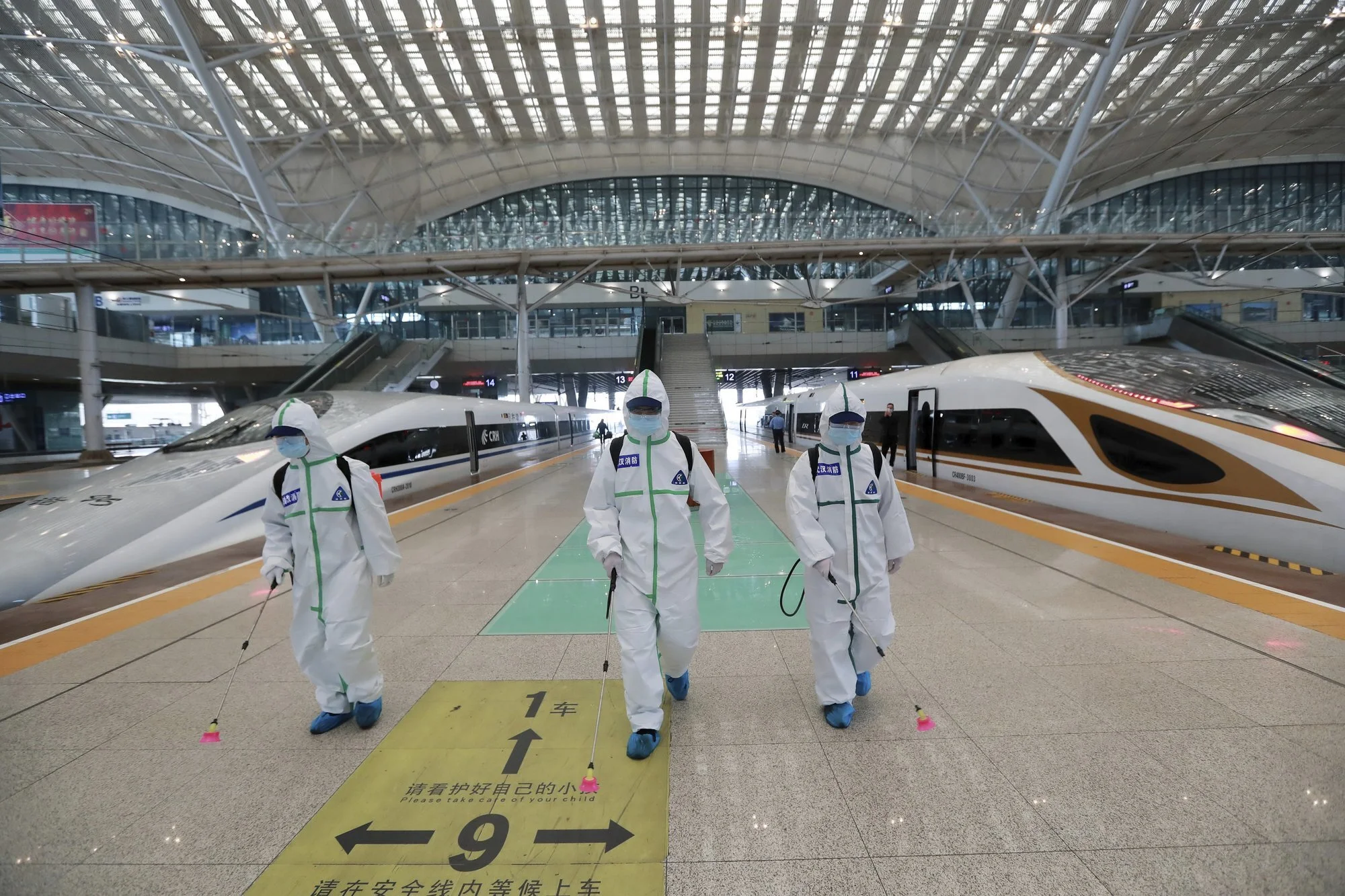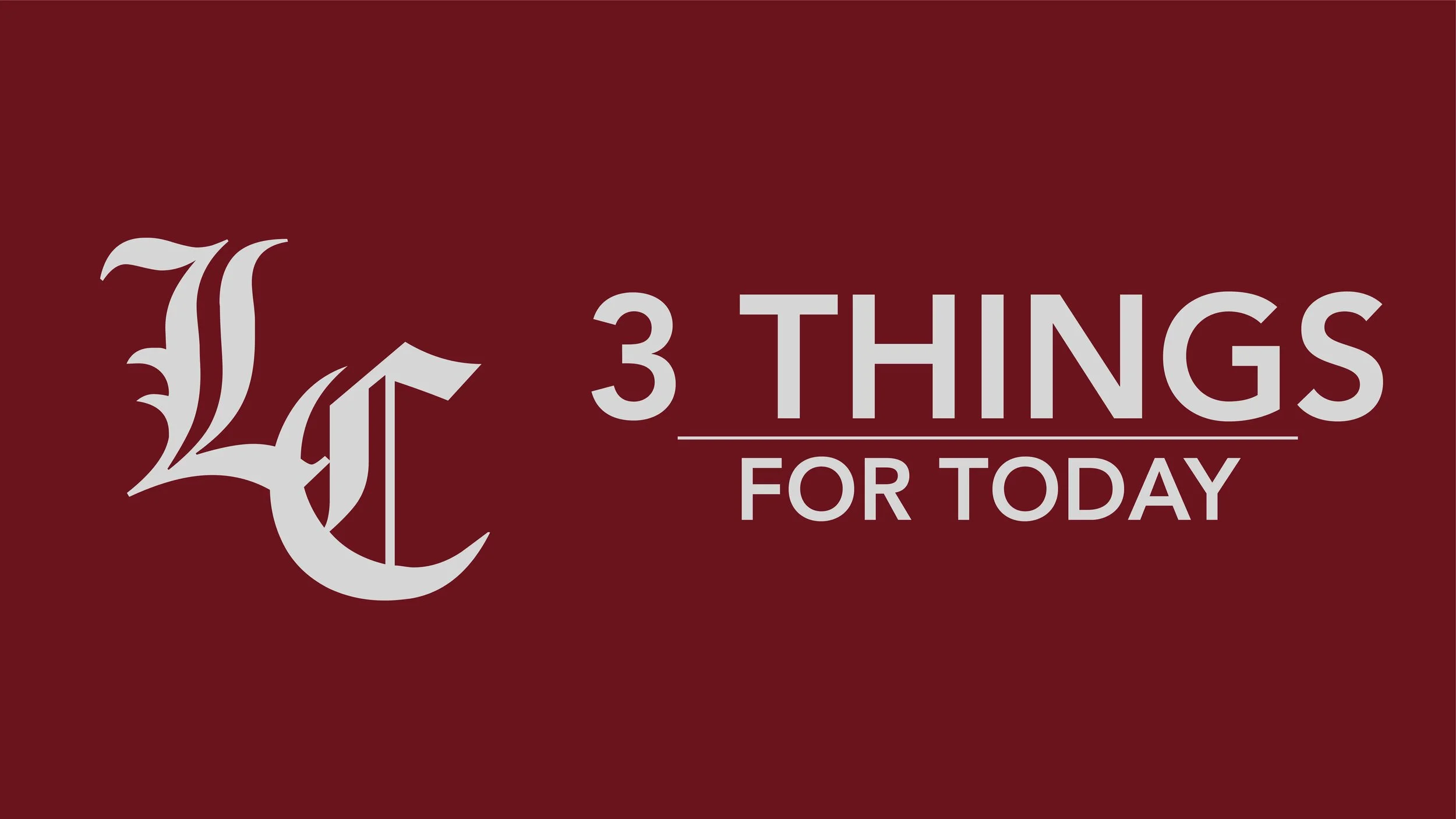Q&A with Lee alumnus in China during COVID-19 outbreak
In this photo released by Xinhua News Agency, firefighters conduct disinfection on the platform of Wuhan Railway Station in Wuhan, central China’s Hubei Province, March 24, 2020. Chinese authorities said Tuesday they will end a two-month lockdown of most of coronavirus-hit Hubei province at midnight, though the provincial capital will remain closed until April 8 as domestic cases of the virus continue to subside. (Zhao Jun/Xinhua via AP)
In the wake of the COVID-19 pandemic, the international community has carefully watched China’s response. Scott Rust, who graduated from Lee in 2018, has seen the impact firsthand while living in Wuxi, China.
What brought you to China?
I’ve been in China since November. So when the situation started, I was here from the first reports and will be here past when it is over. In fairness, I am in the city of Wuxi, which is a long way from Wuhan, where the open seafood market that started this whole mess is located.
I had seen a job posting for a drama teacher in China. The pay is good, the contract is for two years, and it includes a housing stipend for my small apartment. Spending time in Asia learning a new language and getting to teach kids was an adventure I decided that I couldn’t pass up, so I accepted. On Nov. 9, I was in Lee’s Stone Chapel for a friend’s wedding, and the next morning I was in the Knoxville airport headed for Shanghai’s Pudong International. I’ve been here since, with the exception of a short trip to Hong Kong, where I witnessed some of the recent protests.
What has daily life been like for you in Wuxi?
Before the virus began, it was wake up, shower and go to work. When the workday is over, I usually go by the nearby convenience store or a local restaurant and grab dinner. But since the virus broke out, I only leave the apartment if necessary. And even then, I know exactly where I’m going and what I’m trying to do before I get back.
I am also required to wear a face mask in order to travel outside of the apartment. Culturally, people in China tend to wear the face masks anyways, and so I have been wearing one every time that I have to go for groceries.
As an aside, America, the face masks you’re buying are not helpful and will do nothing to prevent the spread of anything viral. They are for medical professionals, who actually need them. Still, my landlord and a friend from the company told me I would have to wear them here until they said it was okay.
We’ve heard terms like “lockdown” and “mandatory quarantine,” but in what ways have you witnessed Chinese officials enforcing these measures where you are?
The collective understanding of the ideals of community and society are radically different in China than in the United States. The Chinese government passes lots of laws, but in practice, the enforcement of those laws on the ground is sort of lax or on a case-by-case basis.
The community polices itself, and everyone looks out for each other while conforming to the accepted social norms. I have not seen a single member of the Public Safety Bureau — Chinese cops — doing anything outside of their normal routines. On Feb. 7 or so, right in the middle of this really ramping up, I didn’t know how serious it was or was going to be, and so I tried to go to a nearby shopping center. I was able to take the subway, which, to my knowledge, was never actually shut down. But when I arrived, the store was not open. Every door was bolted and locked. I saw maybe 50 to 100 people out and about in that entire hour, but no one was enforcing some sort of mandatory lockdown. All businesses were shut down, and all offices were closed. People simply stayed home. The Chinese people are comfortable adjusting to the changes that the government “mandates” on fairly short notice.
However, the different districts of China handled quarantines in different ways. Every major city and highway had people checking temperatures at toll booths. In Wuxi, in my small experience of the city, at least, they also had people checking temperatures at every metro station and at the door of every shop that was open. The people checking were not cops, though, and I don’t know what action would have been taken if I had registered as having a fever.
Do you believe these steps have been effective in preventing further spread?
I think the countermeasures deployed on the local level made all the difference in ensuring the community could continue to function, even as all of China felt like it ground to a halt.
But because of the response on a small scale, the large scale seems to have sorted itself out for the most part. Bold, decisive, direct and swift actions that were taken made it clear that China was considering this a crisis and using its essential infrastructure to weather what this storm will bring.
I worry more about all of you back in the States. The system grinding to a halt here still has the guarantee of universal healthcare, and my company is honoring my contract, so I am still being paid. The U.S. doesn’t have that sense of community baked in all across the country.
Do you know of any friends or colleagues in China who have been infected?
I do not know anyone personally with a confirmed case of COVID-19. Wuxi is approximately 450 miles from Wuhan, so comparing Jiangsu to Hubei would be similar to looking at Kentucky’s response compared to Tennessee’s.
Has there been any change to your process for getting essential groceries and other supplies?
Restaurants and delivery drivers are among the real heroes here because I’ve had to order in almost every night since it started. I don’t have a kitchen or a cupboard in this small room, so if I didn’t have them, I would definitely have died of starvation by now, haha.
How have your friends and family members back home responded to your current situation?
I’ve been keeping in touch with most friends through email. I keep telling them, don’t worry about my safety. Pray for my sanity. The virus is well in hand here. The bigger problems — going stir crazy, lack of social interaction, inability to communicate or have contact with anyone that isn’t through a screen — that’s the real danger of being caged up for months.
I have thought more than once about flying home for a while and coming back when things reopen. Most of my coworkers did travel for the Chinese New Year, and then this situation started soon after that. Past that, though, I think boredom will be a bigger problem for a lot of folks in the coming quarantine time for Tennessee and the USA.
Early on in the pandemic, Western media was largely critical of the Chinese response for a lack of transparency. What kind of information were you receiving in China as this outbreak began?
I can’t speak Chinese yet, so I don’t really know what China was saying myself, even though I am here. I essentially was told everything was shutting down for the Chinese New Year. That happens for basically every Chinese New Year, but a few days before we were supposed to return to work, we were told that all classes had been canceled. I was told there was a virus going around, and I assumed that it would be over in a few weeks.
My landlord told me that I wasn’t allowed to be in the lobby without a mask on, and when I went to the local convenience store, the lady there also said very insistently and repeatedly “mask, mask.” When I said I didn’t own one, I was given several for free and have been using them ever since. Again, they are not actually needed for healthy individuals, but I was wearing them for the fact that it made it possible to go into stores and made the locals more comfortable. That essentially constitutes the entirety of what information I was given on the COVID-19 situation — stay home, no classes and wear a mask when you go out.
I’m sure China could have and should have been more forthcoming in the spread of information, but they also had to be careful to control the message to make sure they didn’t cause widespread panic in the way that hysteria has hit the United States. There’s a balance to it, and nowhere has really handled this as well as they could have.
President Trump has begun referring to COVID-19 as ‘the Chinese Virus.’ What are your thoughts on this?
Oh dear, the president … There’s a lot to say about that particular question. The decision to call it “the Chinese Virus” is motivated by fear-mongering and racism. He is trying to paint it as a foreign virus because the more he can make it separate from America, the more he can use it as an enemy. The truth is much more simple and straightforward than that.
A virus has no nationality. A virus recognizes no borders, and the only boundary it cares about is on the cellular level. It doesn’t target one particular ethnic or national group. It doesn’t care about whether someone is a Democrat, a Republican, an Independent or an indifferent. There is no neutral territory because it isn’t at war with an enemy. It is just a virus, and it doesn’t care about the election or the economy. Calling it “the Chinese Virus” is a pointless, racist and useless distraction to try to take attention away from how badly he has mishandled the situation.
What do the coming months look like, both for you and for China as a whole?
The coming months, with no exceptions, look like dark times ahead for the world we are living in. China may be right in reporting no new cases, or it may not. But regardless, this virus is still spreading all across the globe.
In a few weeks, I might be able to go back to work. China will start to reopen and return to a relative state of normal. But if another outbreak starts, then it will be very likely that the same measures will have to be put back in place all over again.
Honestly, I am a lot more worried for America in the months to come. Please, self-police and tell people to stay home. Our actions affect other people, and there will be long-term repercussions for regularly choosing to ignore the advice of experts.
Anything else you’d like to share about your experience so far?
As some closing advice from China — stay inside and go out once a week to buy necessities, but do not get more than a reasonable amount or hoard things. Some stuff will still remain open. Always thank the people who are having to work through this because they really are essential. Work on building community and re-establishing connections with your contacts because this is a good time to check up on folks.
Try not to panic. Call your congresspeople, and become more active at the local level. This is not going to go away anywhere near as quickly as Trump might say it will, no matter how loudly or how many different ways he says it.
It isn’t going to be all over in two weeks. I’ve been in isolation for two months. Dig in, but don’t despair. The world will recover, and hopefully, we will make it better because of what flaws we have found from COVID-19. This is an impartial test. We will pass or fail together, so study up!



